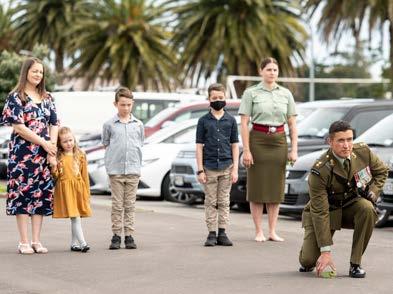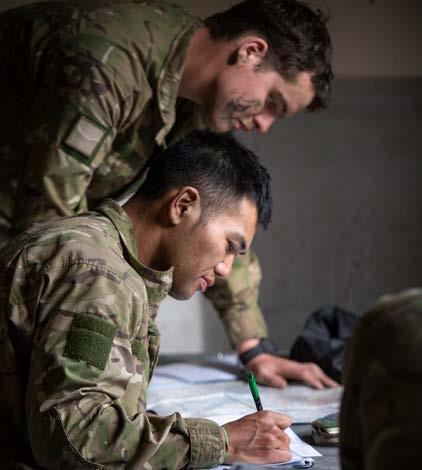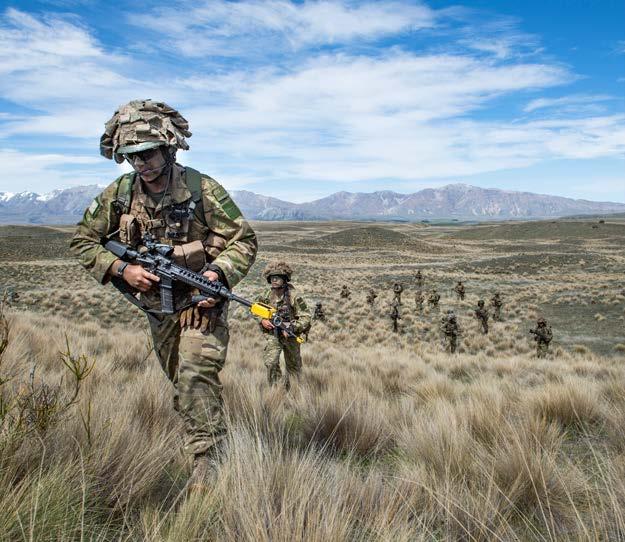
5 minute read
New command 2ER
A NEW LEADER AT 2ER
The leadership of 2nd Engineer Regiment has changed, with Lieutenant Colonel Mike Nochete taking over command from Lieutenant Colonel Ian Brandon.
Advertisement
The ceremony saw the handover of the “Upoko O Te Taiaha” which is the 2nd Engineer Regiment symbol of Command, and the presentation of the Regimental Colonel Change of Command symbol, the Tewhatewha to LTCOL Nochete.
Brigadier Hugh McAslan was the reviewing officer for the parade, with Colonel Paul Curry the Colonel Commandant of the Royal New Zealand Engineers also in attendance.
“Nga kiahanga e mahi mo ratou i tenei ra, a nga kaihanga te mana mo apopo – those who build for others today, build the mana of tomorrow,” LTCOL Nochete told those gathered for the ceremony.
“I’d like to acknowledge the outstanding stewardship of LTCOL Brandon. His professionalism, engaged, and empathetic leadership has guided the Regiment through a difficult period. He has laid a foundation that the Regiment can build on as we look to regeneration across the Army.
“To my fellow Sappers, it’s good to be back at the home of the Sapper. I am proud to once again be standing amongst you and I look forward to serving you as the 16th Commanding Officer of the 2nd Engineer Regiment.
“As we look to the future we will focus on junior leadership, the ability to train safely and effectively to enhance our tactical and technical proficiency, sharpen our operational focus, and heighten our strategic awareness. Our capabilities as a Corps, start and end, with the Sapper. It is the Sapper that responds to crisis, it is the Sapper that uplifts the vulnerable, it is the Sapper that leads the way.”


TRAINING OUR FUTURE LEADERS
By Lucy Handford

Becoming a competent and skilled leader is a significant milestone for those in uniform.
To get to that point there’s a lot of rigorous training, testing and assessment. That’s exactly what happens at the 3rd Regional Training Wing (3RTW), Army Command School, which runs the Junior Non Commissioned Officer (JNCO) course – Lance Corporals’ first promotion course.
The ten-week-long course takes place three times per year at both 2 and 3RTW and trains personnel from across the Army who have been selected by their chain of command because they exhibit the qualities required to be an effective leader. Senior Instructor, Warrant Officer Class Two Geoff Smith, 3RTW, says the modus operandi for the JNCO course is very simple.
“We are here to train our future leaders, so they are able to command, manage, lead and train their subordinates whether on operations or not. We’re looking for knowledge, skill, loyalty, initiative, responsibility, courage, endurance, and above all professionalism. These are the qualities that make up an effective JNCO,” he said.
What’s striking about the course is that it brings together a diverse group of personnel selected from a wide range of units and trades with varying experience and skills. The recently completed course in Burnham, qualified 19 personnel from infantry, to logisticians, combat engineers to a musician and a dental assistant. The course demands that each individual works seamlessly to lead themselves, but more importantly they successfully transition from Lead Self to Lead Teams, in accordance with the NZDF Leadership Framework.
The penultimate phase of the course was Exercise Young Lion, a ten-day deployment to the Tekapo Military Training Area. The scenario is designed to replicate a real-life operation; everything the soldiers learn in the classroom in the seven weeks prior are put into practice out in the field. Each individual must lead a section through complex and challenging scenarios, including Stability and Support Operations type tasks (urban patrolling, vehicle check points), clearance of objectives, Quick Reaction Force, to name a few. All scenarios that the commanders find themselves in, are designed by following some basic tenets: shoot, move, communicate and medicate.
WO2 Smith’s description of a day on the exercise gives some insight into the planning, preparation and decisiveness that’s required to be a successful leader.
“The commander receives their task at 1700, they then go through the individual military appreciation process (decision-making process). At 1900, they back brief their instructor on their plan. From here they write up a set of verbal orders (detailed instructions to subordinates), detailing how they are going to achieve the mission. The following morning at 0700 they deliver their verbal orders to their section. The final part is the practical task where from 0800–1200 or 1300–1700, they lead and command their section,” he said.
Lance Corporal Luca Soares Gonzalez took part this year. He joined the Army in 2014 and is 2IC in Reconnaissance and Surveillance Platoon, 2nd/1st Battalion Royal New Zealand Infantry Regiment. While on the course he discovered that working with people with all sorts of backgrounds was beneficial because it developed his leadership style.
“Learning how to take lessons in the classroom, more practical ones outside, and then with the field phase was good exposure on how to control a task and get it done. Prior to this I’d never worked with such a different variety of trades and backgrounds, and in many respects that was the icing on the cake because that’s what developed me as a leader,” he said.
LCPL Se Won Kim also joined the Army in 2014 and is a Section 2IC within 1 Platoon, Alpha Coy, 2nd/1st Battalion Royal New Zealand Infantry Regiment. He discovered that there’s far more to leadership than just commanding a section. “The exercise made me realise the pressure that our leaders face. They have to think about so much, it’s not just the task, they also need to take into account every individual’s needs to achieve the task and accomplish the mission,” he said.
The course concluded with a March Out parade to officially mark the completion of their studies. Several awards were presented, to highlight particular students including LCPL Soares Gonzalez who received the Leadership Award. Voted by his student peer group, LCPL Kim received the Peers Award for displaying the attributes and core values of the NZ Army throughout the course, as well as the Instructor Excellence Award for gaining the highest aggregate marks in the delivery of both Mental and Physical Skills Instruction and Battle Handling Lessons. The award for Top Student was presented to LCPL Benjamin Dovaston of Depot Coy, 2nd/1st Battalion Royal New Zealand Infantry Regiment for the consistently high standards he displayed throughout the course.





– WO2 Geoff Smith Senior Instructor

